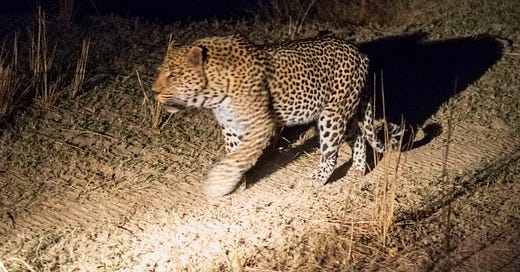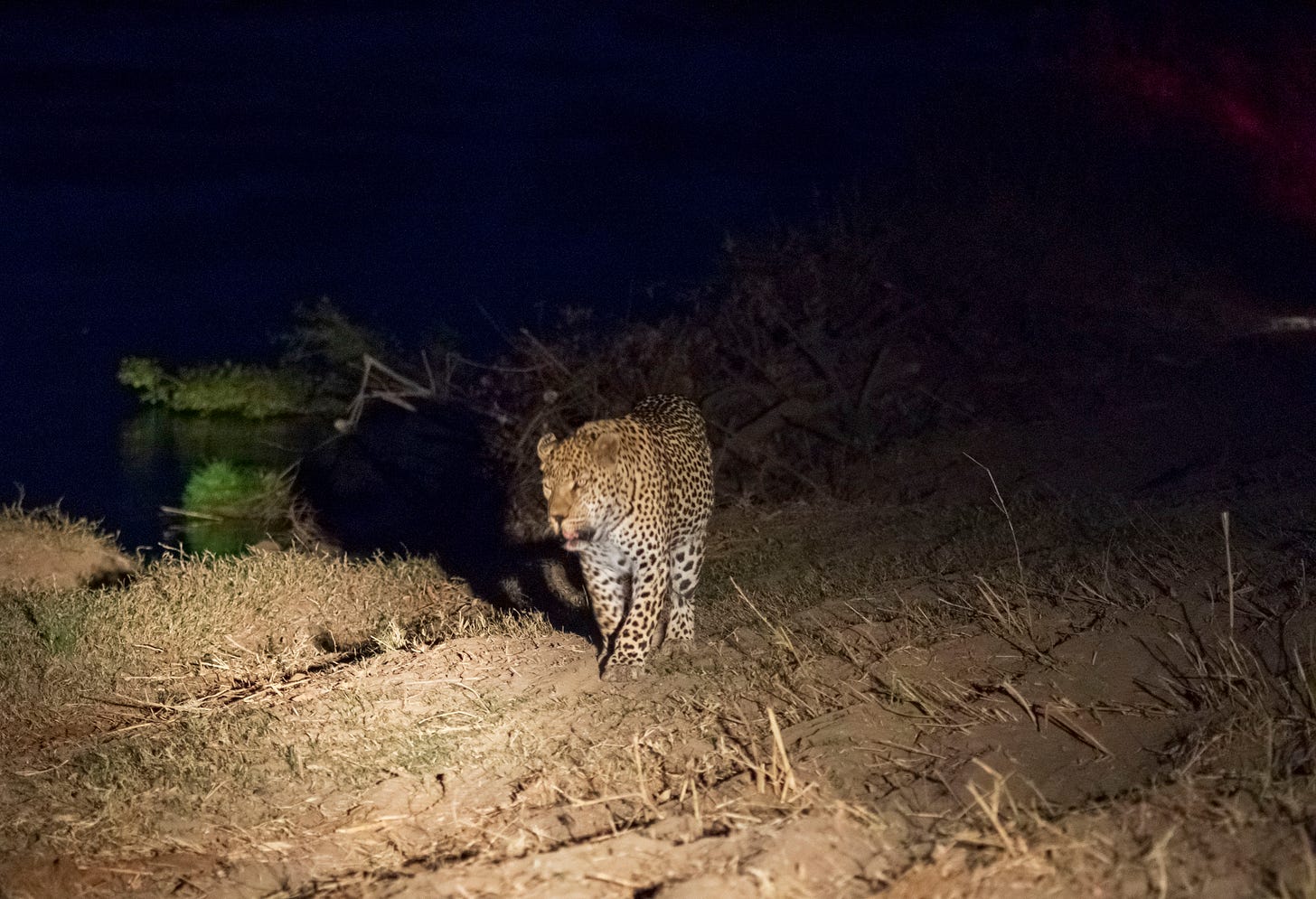I fell. It was the kind of fall where one minute you’re walking, thinking about whether you’re going to be within the normal, grace period of being late — say, just a minute or three, the kind of late that no one notices — or whether you’re going to be more than that and have to apologize, or whether there might be some way not to be late at all if you manage to catch all the lights on East Capitol and if, by some miracle, there aren’t any joggers, when suddenly the sidewalk is two centimeters from your nose and you’re not entirely certain where your limbs are, or if you can breathe.
Michael took me to Urgent Care and, rather to my surprise, nothing was broken. I was just sprained and bruised, but any weekend plans for long walks in nature were out of the question.
Instead I’ve settled into my velvet couch, as verdant as a patch of jungle greenery, to re-read one of my all-time comfort reads, “Whatever You Do, Don’t Run: True Tales of a Botswana Safari Guide.”
“A good safari guide has many stories to tell,” writes Peter Allison, “usually around a campfire while his or her guests enjoy wine and whiskey and are ready to be amused.
“A bad safari guide has even more.”
The thing is, safaris act as a compression machine for stories. You take a bunch of strangers, throw them into close contact for hours, raise the stakes with the amount of time and money spent to get there, add the potential danger inherent in the environment, and you get the kind of behavior that usually only happens in community theater. Divas? Feuds? Like you wouldn’t believe.
I should add that the kind of safari I’m describing is not the only kind of safari available.
For one thing, safaris don’t have to be expensive.
You can drive around South Africa’s most famous national park, Kruger National Park in much the same way that, in America, you might drive around Yosemite, just with way more megafauna wildlife sightings. Also, for obvious reasons, there are fewer places to walk into the wilderness in Kruger.
It’s my understanding that South Africans generally go on safari this way, staying in lodging maintained by their national park service, SANParks. FYI, competition for this housing gets fierce around their summer holidays (our winter), so you’d need to book ahead just like you’d book ahead for Yellowstone.
Other options include self driving in Namibia; picking up a car and driving through the Kalahari (though blogs I’ve read recommend taking specific classes on driving through sand and what to do if you get stuck); camping in Botswana, etc. (The links are not an endorsement, just an idea of what’s possible). I can talk more about any of these if anyone’s interested.
Despite all these options, the most common safari taken by tourists is the guided lodge safari. By staying in a lodge, you’re fed three-ish meals a day (though very often, you’re fed more like four meals a day), and you’re taken on safari drives at least two times a day (and sometimes you can take an optional night drive).
Most people who take these kinds of safaris expect their vacation to be a “once in a lifetime” experience. They’ve got a bucket list, and they want to toss “safari” in the bucket before kicking it themselves.
That was certainly what I thought when I went on my first safari, that I’d never be able to get back, that I had to squeeze the most out every experience.
And the same was almost certainly the case the case with the Absolutely Fabulous ladies, we just differed in what experiences we thought we wanted to squeeze.
I hadn’t met them when they came in — they must have arrived quite late — so instead I met them when we were all gathering for our pre-dawn coffee and eye rub, right before the morning drive. Or at least, for most of us, it was a time for our first shot of caffeine and remembering how the English language worked. But not for the AbFab ladies. They called for champagne.
“Champagne?” asked their guide, who, I thanked the heavens, was not ours.
“Just one little glass of champers before we go!”
The guide shrugged and called for champagne; I and my group were already headed out before the first bubbly hit the glass.
The ladies were not, of course *the* Absolutely Fabulous ladies, but they might as well have been. Many people come to Africa looking for “the Big Five” — an old hunting term denoting the five animals that were supposedly the hardest to hunt: African elephants, African buffalo, lions, leopards, and rhinoceroses.
These ladies were looking for the Big Five but not, they clarified, THAT big five; they compared and classified the charms of every (exclusively male) guide or tracker from every vehicle whose path we crossed. While on a sighting of a lion with a vehicle from another camp, we could hear them approaching; their guide didn’t slow down for a second, but still I could hear them catcalling the other camp’s guide: “You can be a member of *our* Big Five!”
I was a few months out from my Dad’s death and realizing that this safari was probably going to save my sanity. The AbFab ladies crashed into my spiritual-plane-of-existance, Very Seriously Trying To Learn About Wildlife moment like a buffalo through a pup tent.
At first I felt like busting both of them over their wildlife-fact-free heads with their silly, endless champagne bottles, but everyone else loved them so much, and took such a delight in their capers, that eventually, even I began to feel their charm.
And I had to admit: they did like *one* animal. A lot.
The male leopard named the Ravenscort male had inherited his mother’s territory when she had died the year before. He was now defending the territory in that intense way common to males who have something to prove, and now, it was time to make babies.
The Ravenscourt Male
In looking back at my pictures, I’m not finding any of Ravenscort with his mate. Maybe it’s a case of bad organization, or maybe it’s a further marker of my prudishness at that moment, masquerading as “seriousness.” Whatever it was, it was not shared in any way by the Absolutely Fabulous ladies.
While I definitely remember our vehicle stopping by the mating leopards, the Absolutely Fabulous ladies were riveted. For once, their vehicle was the first to leave in the morning, and in the evening, over our communal dinners, we were all regaled with pornographic tales of how long the leopards had done it, and how many times, and what their expressions were like at the beginning of the day, and then when they were distracted, and then again when the AbFab ladies thought they were really into it.
It was a master class in leopard erotica.
Because, you see, safaris really are like community theater: there’s a place for every oddball. You might be there because you’re a broken hearted klutz, or you might be there because you’re a champagne-guzzling leopard nympho.
The wildlife doesn’t care.
It’ll make you happier, or sadder, or more alive, or more turned on than you thought possible, but given the opportunity and space, it just keeps living.
I can’t end the week without mentioning the death of Scarface, one of the best-known of all lions in Africa, and one of the first to be marketed as a “named” lion.
Prior to Scarface, there had been some controversy about naming lions. The editor of Africa Geographic wrote:
When I started guiding in the dim mists of prehistory, we were given strict instructions never to give wild animals names. ‘They are not pets and we don’t want guests to think our cats are tame.’ As a wet behind the ears biologist, I thought this was excellent. Most guides heartily agreed, despite some rather obvious contradictions. We’d refer to the Clara Dam female as ‘Clara’ or the Pink-nose Mxabene Young Male as ‘Pinky’.
Cecil and Scarface changed my mind. Their fame built awareness for the plight of their species and the wilderness in general.
I would add that, beyond marketing, what people are reacting to when they react to a named animal is the acknowledgment of the animal’s individuality. And that, to me, is perfectly accurate. You have only to spend a few hours with almost any animal at all, truly noting its behavior, to notice that its behavior isn’t *human,* but it is certainly *individual.*
I might go back and re-watch an episode or two of the BBC’s Big Cat Diary (in which Scarface starred) just to hear that enormous roar once more.






I've never wanted to go on safari, but your stories may change my mind!